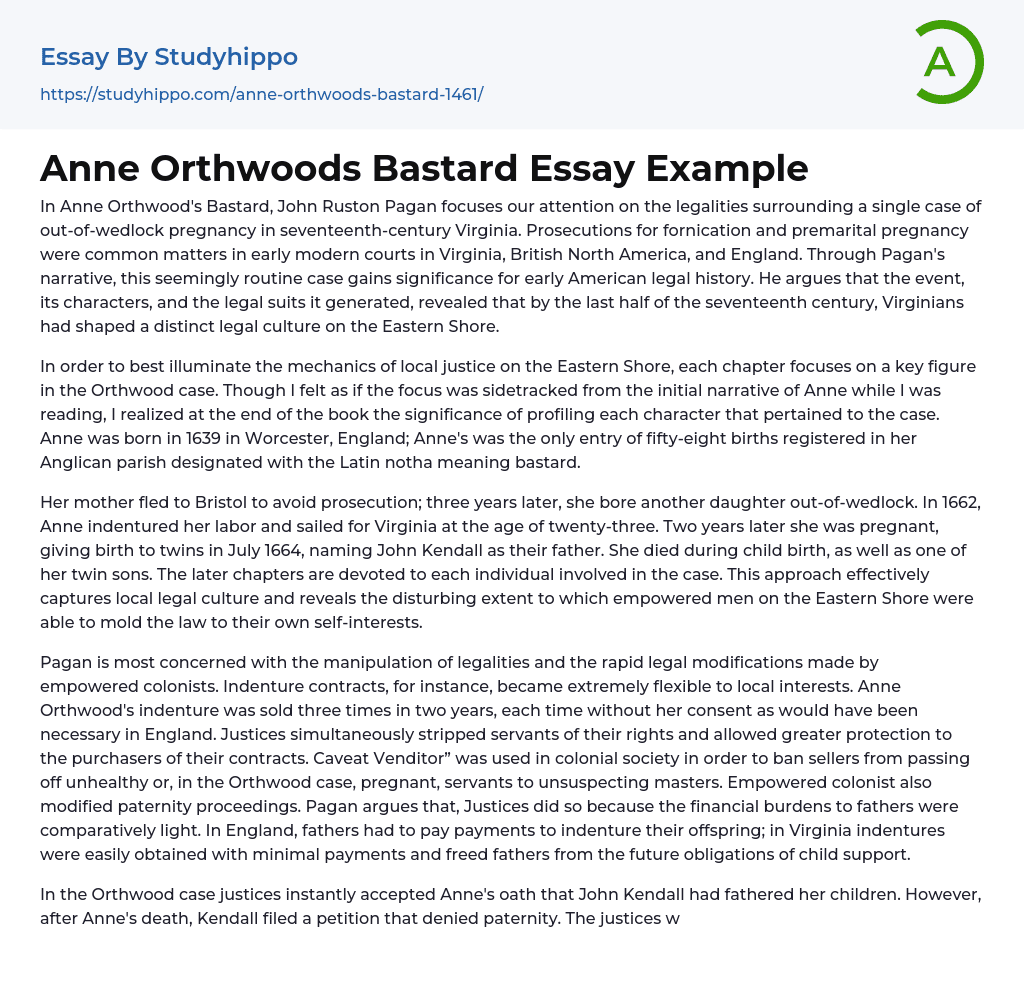
In Anne Orthwood's Bastard, John Ruston Pagan focuses our attention on the legalities surrounding a single case of out-of-wedlock pregnancy in seventeenth-century Virginia. Prosecutions for fornication and premarital pregnancy were common matters in early modern courts in Virginia, British North America, and England. Through Pagan's narrative, this seemingly routine case gains significance for early American legal history. He argues that the event, its characters, and the legal suits it generated, revealed that by the last half of the seventeenth century, Virginians had shaped a distinct legal culture on the Eastern Shore.
In order to best illuminate the mechanics of local justice on the Eastern Shore, each chapter focuses on a key figure in the Orthwood case. Though I felt as if the focus was sidetracked from the initial narrative of Anne while I w
...as reading, I realized at the end of the book the significance of profiling each character that pertained to the case. Anne was born in 1639 in Worcester, England; Anne's was the only entry of fifty-eight births registered in her Anglican parish designated with the Latin notha meaning bastard.
Her mother fled to Bristol to avoid prosecution; three years later, she bore another daughter out-of-wedlock. In 1662, Anne indentured her labor and sailed for Virginia at the age of twenty-three. Two years later she was pregnant, giving birth to twins in July 1664, naming John Kendall as their father. She died during child birth, as well as one of her twin sons. The later chapters are devoted to each individual involved in the case. This approach effectively captures local legal culture and reveals the disturbing extent to which empowered men on the Eastern Shor
were able to mold the law to their own self-interests.
Pagan is most concerned with the manipulation of legalities and the rapid legal modifications made by empowered colonists. Indenture contracts, for instance, became extremely flexible to local interests. Anne Orthwood's indenture was sold three times in two years, each time without her consent as would have been necessary in England. Justices simultaneously stripped servants of their rights and allowed greater protection to the purchasers of their contracts. Caveat Venditor” was used in colonial society in order to ban sellers from passing off unhealthy or, in the Orthwood case, pregnant, servants to unsuspecting masters. Empowered colonist also modified paternity proceedings. Pagan argues that, Justices did so because the financial burdens to fathers were comparatively light. In England, fathers had to pay payments to indenture their offspring; in Virginia indentures were easily obtained with minimal payments and freed fathers from the future obligations of child support.
In the Orthwood case justices instantly accepted Anne's oath that John Kendall had fathered her children. However, after Anne's death, Kendall filed a petition that denied paternity. The justices were persuaded and ruled in favor of Kendall, but they did not alter their earlier verdict that obligated Kendall to remain legally responsible for the support of the infant Jasper, whom he quickly indentured. In paternity proceedings, the presumed truth of a woman's word was, largely, unquestionable, but a man with powerful allies, like John Kendall, could maneuver to escape full responsibility.
Initially, I was shocked to discover that these modifications and maneuvers in no way amended the penalties endured by mothers who were burdened with penance, extra service, fines, or corporal punishment. I suppose
that in a world where a women has no voice or equality among men, this discovery would be rather less shocking. Anne Orthwood's Bastard often resembles a claim where VIPs played out their interests through their grip on local legal culture; however Pagan demonstrates that the law could also work against the powerful.
In the aftermath, the justices had stricken John Kendall with a fornication suit, although they later dismissed it. Jasper Orthwood successfully sued for his freedom at the age of twenty-one, rather than waiting to reach the customary age of twenty-four, and thereby set a legal standard for similar emancipations in the future. In these ways, Pagan's thorough research and compelling narrative engages readers in the legal world of the Eastern Shore and provides them with a lesson in the harsh realities of law in early America.
- Child essays
- Childcare essays
- Child labor essays
- Doll essays
- Jurisprudence essays
- Social Injustice essays
- Juvenile Justice essays
- Business Law essays
- Contract essays
- Consumer Protection essays
- Property essays
- Ownership essays
- Agreement essays
- Common Law essays
- Contract Law essays
- Justice essays
- Security essays
- Tort Law essays
- United States Constitution essays
- Crime essays
- Lawsuit essays
- Treaty essays
- Family Law essays
- Marijuana Legalization essays
- Constitution essays
- War on Drugs essays
- Court essays
- Jury essays
- Police essays
- Protection essays
- Community Policing essays
- Criminal Law essays
- Judge essays
- Lawyer essays
- Employment Law essays
- Copyright Infringement essays
- Injustice essays
- Intellectual Property essays
- Breach Of Contract essays
- Internet Privacy essays
- Cyber Security essays
- Bill Of Rights essays
- Civil Liberties essays
- First Amendment To The United States Constitution essays
- Fourth Amendment To The United States Constitution essays
- Second amendment essays
- Animal Cruelty essays
- Law Enforcement essays
- Juvenile Justice System essays
- Surveillance essays



